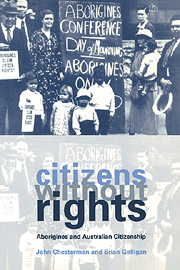Book contents
- Frontmatter
- Contents
- List of Tables
- Acknowledgments
- Abbreviations
- Dedication
- Introduction
- 1 The Citizenship Divide in Colonial Victoria
- 2 Under the Law: Aborigines and Islanders in Colonial Queensland
- 3 Is the Constitution to Blame?
- 4 The Commonwealth Defines the Australian Citizen (in association with Tom Clarke)
- 5 The States Confine the Aboriginal Non-citizen
- 6 The Slow Path to Civil Rights
- 7 From Civil to Indigenous Rights
- Notes
- Bibliography
- Index
1 - The Citizenship Divide in Colonial Victoria
Published online by Cambridge University Press: 22 August 2009
- Frontmatter
- Contents
- List of Tables
- Acknowledgments
- Abbreviations
- Dedication
- Introduction
- 1 The Citizenship Divide in Colonial Victoria
- 2 Under the Law: Aborigines and Islanders in Colonial Queensland
- 3 Is the Constitution to Blame?
- 4 The Commonwealth Defines the Australian Citizen (in association with Tom Clarke)
- 5 The States Confine the Aboriginal Non-citizen
- 6 The Slow Path to Civil Rights
- 7 From Civil to Indigenous Rights
- Notes
- Bibliography
- Index
Summary
At the close of… seven years, [the half-castes] should have no further claim on the Board or Government, but be accounted in all respects free and equal citizens of the colony.
Victorian Board for the Protection of the Aborigines, 1884One of the lowest points in the history of race relations in Australia came in 1902 when, in a late amendment to the franchise bill, every ‘aboriginal native of Australia’ was excluded from the federal franchise. This exclusionary clause, as we will show in chapter 4, was systematically defined and refined by the federal bureaucracy, and utilised by successive federal governments for over six decades to deny Aboriginal Australians citizenship rights and benefits, including the maternity allowance, invalid and old-age pensions, and even overseas travel.
A federal political system such as Australia's entails two levels of government and dual citizenship. Consequently, the rights and benefits of citizenship are not the sole preserve of the federal government. The States, with their residual powers over areas such as health, education, land, and civil and criminal law, are significant in determining citizenship rights and entitlements. Moreover, since the States predated the Commonwealth as self-governing colonies, their established colonial citizenship regimes were influential in shaping the design of the new Commonwealth Constitution. Indeed, a major reason for the new federal government not being given a specific constitutional power to make laws with respect to Aboriginal people was the consideration that Aboriginal people were already sufficiently ‘taken care of’ under State laws.
- Type
- Chapter
- Information
- Citizens without RightsAborigines and Australian Citizenship, pp. 11 - 30Publisher: Cambridge University PressPrint publication year: 1997



